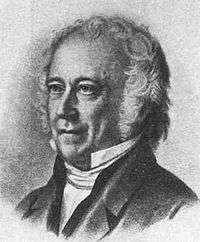Carl von Winterfeld
Carl Georg Vivigens von Winterfeld (28 January 1784 – 19 February 1852) was a German musicologist.

Origin
Winterfeld was born in Berlin. His parents were Karl Friedrich Gotthilf von Winterfeldt (17 May 1757 - 14 September 1824) and his wife Sophie Elisabeth Helene Wilhelmine von Köhler (28 March 1754 – 13 April 1821).
Life
Winterfeld studied Jurisprudence at the damaligen Martin-Luther-Universität Halle-Wittenberg and was appointed judge in Breslau in 1816. After his return to Berlin in 1832, he was appointed to the Obertribunalrat and in 1839 became an honorary member of the Prussian Academy of Arts. Winterfeld was a founding member of the Bach Society and since 1835 a member of the Gesetzlose Gesellschaft zu Berlin. Winterfeld is considered the rediscoverer of Heinrich Schütz.[1] In 1812 he undertook a journey to Italy, where he made copies of compositions from the 16th to 18th century. Today the collection is kept in the Berlin State Library. Winterfeld was a patron of Hoffmann von Fallersleben. In gratitude August Heinrich Hoffmann von Fallersleben dedicated the song collection "Siebengestirn gevatterlicher Wiegen-Lieder für Frau Minna von Winterfeld" to him or his wife Wilhelmine "Minna" von Winterfeld and their children
Family
Winterfeld married Wilhelmine von Thümen (20 June 1789 – 1 November 1845). The couple had several children, including
- Siegismund, Hoffmann von Fallersleben's godfather.
- Rudolf (22 March 1829 – 23 July 1894) ∞ Pauline von Roeder (5 January 1845 – 15 August 1914)
Writings
- Giovanni Pierluigi da Palestrina. Breslau 1832.
- Giovanni Gabrieli und sein Zeitalter. Berlin 1834 (Part 1 is available for free download at the Internet Archive; Part 2 is available for free download at the Internet Archive; Teil 3 (Notenanhang) is available for free download at the Internet Archive).
- Dr. Martin Luther's deutsche geistliche Lieder.[2] Leipzig 1840.
- Der evangelische Kirchengesang und sein Verhältniss zur Kunst des Tonsatzes.[3] Leipzig 1843–47.
- 1. part: Der Evangelische Kirchengesang im ersten Jahrhunderte der Kirchenverbesserung. Breitkopf und Härtel, Leipzig 1843 (Numerized at Google Books).
- 2. part: Der Evangelische Kirchengesang im siebzehnten Jahrhunderte. Breitkopf und Härtel, Leipzig 1845 (Numerized at Google Books).
- 3. part: Der Evangelische Kirchengesang im achtzehnten Jahrhunderte. Breitkopf und Härtel, Leipzig 1847 (Numerized).
- Zur Geschichte heiliger Tonkunst.[4] Leipzig 1850–52.
Further reading
- Robert Eitner (1898), "Winterfeld, Karl von", Allgemeine Deutsche Biographie (ADB) (in German), 43, Leipzig: Duncker & Humblot, pp. 490–492
- Bernhard Stockmann: Winterfeld, Carl Georg Vivigens von. In Grove Dictionary of Music and Musicians. 2nd edition, published by Stanley Sadie, Macmillan, London 2001, ISBN 0-333-60800-3.
- Ruth Engelhardt. "Carl von Winterfeld". Biographisch-Bibliographisches Kirchenlexikon (BBKL) (in German). cols. 1408–1412.
- Gothaisches genealogisches Taschenbuch der adeligen Häuser. 1904, Fünfter Jahrgang, p. 920 (Numerized).
References
- Carl von Winterfeld: Johannes Gabrieli und sein Zeitalter. 2. Theil. Berlin 1834, pp. 8–212 (Numerized at Google Books)
- Dr. Martin Luthers deutsche Geistliche Lieder : nebst den während seines Lebens dazu gebräuchlichen Singweisen... on WorldCat
- ''Der evangelische Kirchengesang und sein Verhältniss zur Kunst des Tonsatzes. on GoogleBook
- Zur Geschichte heiliger Tonkunst on WorldCat
External links
| Wikimedia Commons has media related to Carl von Winterfeld. |
- Literature by and about Carl von Winterfeld in the German National Library catalogue
- Works by and about Carl von Winterfeld in the Deutsche Digitale Bibliothek (German Digital Library)
- Carl von Winterfeld bei schlossarchiv.de
- Winterfeld, Carl von on Weber complete work.
- Works by Carl von Winterfeld at Open Library